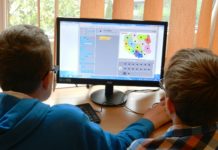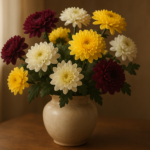|
The aim:
Vocabulary:
Org. moment:
Brainstorming: Checking up homework:
The main part:
Vocabulary: Pronunciation:
Homework:
Reflection:
Marks: |
to teach students learning vocabulary on the topic. tulip, snowdrop, rose, dandelion, daisy, a pot flower, to plant, to smell, a smell, a scent, indoor plants. The procedure of the lesson: T: Good morning, dear children! Sit down! Who is on duty today? What date is it today? Who is absent today? What day is it today? What’s the weather like today? Ex. 1 p. 59 Look at the picture. Do you know the Russian names of these flowers? Exercise 16. p. 44 Complete the chart about deserts and tropical forests. Exercise 12. p. 42 Learn the new words. Exercise 17. p. 44 Find some information about a desert and a forest and write about it. Do you like plants and trees? What plants do you know? Do you have any plants at home? Today we are going to talk about flowers. Open your vocabularies and write down the new words. Repeat after me in chorus! tulip тюльпан ?ыз?алда? snowdrop подснежник б?йшешек rose роза dandelion одуванчик ба?ба? daisy маргаритка, ромашка д?ст?рг?л a pot flower горшок цветочный г?лді? горшогы to plant посадить егу to smell запах иіс a scent аромат хош иіс indoor plants комнатные растения ?йде ?сетін ?сімдіктер Ex. 2 p. 59 Read the text about a dandelion. What is name of the flower? The flower got its name a funny way. Its each leaf looks like a row of teeth. The people of France gave the name dent’de lion. It means lion’s teeth. Ex. 3 p. 60 Read the chart and complete it. Then practice the pronunciation of the new words. ROSE – What colours is it? red, white Where does it grow? In the south of Kazakhstan. When? In spring What does it look like? It looks like ……. DAISY – What colours is it? White and yellow in the middle. Where does it grow? In the country When? In ………… What does it look like? It looks like the sun SNOWDROPS – When? In spring Ex. 4 p. 61 Read the text. Write a text about your favourite flower. Ex. 5 p. 61 Pair work. Make up a dialogue using the questions and the expressions in the box. Ex. 6 p. 61 Interview your partner ant fills in the table. Do you plant flowers? When do you usually plant flowers? Where do you usually plant flowers? What’s your favourite flowers? Why is it your favourite flowers? Do you have a pot flower at home? Do you water it? How often do you water it? Ex. 7 p. 62 Talk about your interviews using the example. Ex. 8 p. 62; to learn the new words. What was the theme of our lesson? What interesting things did you know? The marks for the lesson are … The lesson is over! Good-bye! |














